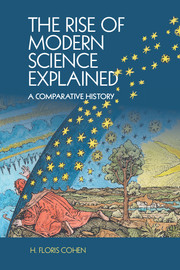Book contents
- Frontmatter
- Contents
- Introduction: the Old World and the New
- 1 To begin at the beginning: nature-knowledge in Greece and China
- 2 Islamic civilisation and medieval and Renaissance Europe
- 3 Three revolutionary transformations
- 4 A crisis surmounted
- 5 Expansion, threefold
- 6 Revolutionary transformation continued
- Epilogue: a look back and a look ahead
- Timeline 1: pre-1600
- Timeline 2: 1600–1700
- A note on the literature
- Provenance of quoted passages
- Index
6 - Revolutionary transformation continued
Published online by Cambridge University Press: 05 March 2016
- Frontmatter
- Contents
- Introduction: the Old World and the New
- 1 To begin at the beginning: nature-knowledge in Greece and China
- 2 Islamic civilisation and medieval and Renaissance Europe
- 3 Three revolutionary transformations
- 4 A crisis surmounted
- 5 Expansion, threefold
- 6 Revolutionary transformation continued
- Epilogue: a look back and a look ahead
- Timeline 1: pre-1600
- Timeline 2: 1600–1700
- A note on the literature
- Provenance of quoted passages
- Index
Summary
The previous chapter may have given you, dear reader, the impression of being shown round three different rooms in the house of nature-knowledge. First of all you visited the kitchen, then the best room and then the playroom. In each room the furniture was very different. Each mode of nature-knowledge differed not only in its outcomes but also in its style of reasoning, in its handiwork (if any were involved) and in its exploration of ways and means to counter what Newton called ‘fansying’. In other words, each of the three worked largely in its own way, and the high walls separating ‘Athens’ from ‘Alexandria’, which we first encountered with the ancient Greeks, were still standing unscathed. Although in Europe, together with a third mode of nature-knowledge, they had gone through a revolutionary transformation, hardly any effort had as yet been made to end their mutual isolation. It is true that we have encountered a few individuals, especially Huygens and the young Newton, who were involved in both realist-mathematical nature-knowledge and exploratory, fact-finding experiment. But for each mode they wore, as it were, a different hat. They behaved in the one quite differently from in the other and in each they followed prevailing practices and styles of thought (which they seized upon to make some splendid discoveries).
And yet it was also these two, Huygens and the young Newton, together with Boyle and Hooke, who managed to some extent to break down the walls separating different modes of nature-knowledge or at least to make sizable breaches in them.
BARRIERS BROKEN DOWN
Three aspects to this breaching of the walls should be noted. There is the political and religious background which we might call ‘the spirit of Westphalia’. Then, within each of the three modes of revolutionary nature-knowledge there are certain recurring themes which more or less incidentally lend themselves to crossover. One such theme is the making of measurements, the other is thinking in terms of moving particles. Finally, there is the unprecedented fact itself of crossing the boundaries between distinct modes of nature-knowledge. It takes the form of two new, and again revolutionary, transformations. For certain specific subjects such as impact, circular motion, light and chemical reactions it proves possible to merge the practices and styles of reasoning current in two distinct modes of nature-knowledge.
- Type
- Chapter
- Information
- The Rise of Modern Science ExplainedA Comparative History, pp. 218 - 255Publisher: Cambridge University PressPrint publication year: 2015



